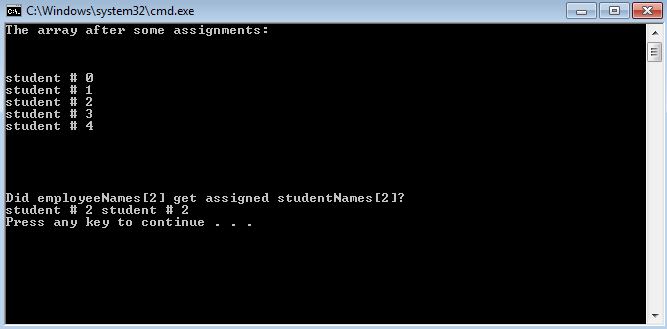Section 3 - Applying the Template to Other Types
8A.3.1 A Safe Class of Strings
The hard work is done. Now we can use this SafeArray template for other types. Let's try a SafeArray of strings. No change to the class whatsoever. No derived classes. We just change the client:
#include <sstream>
int main()
{
int k;
SafeArray<string> studentNames(5);
// assign data and go out-of-bounds
for (k = -3; k < 10; k++)
{
string stringNum;
ostringstream cnvrt;
cnvrt << k;
stringNum = cnvrt.str();
studentNames[k] = "student # " + stringNum;
}
cout << "The array after some assignments:\n";
for (k = -3; k < 10; k++)
cout << studentNames[k] << endl;
// test the assignment operator
SafeArray<string> employeeNames(40);
employeeNames = studentNames;
cout << "Did employeeNames[2] get assigned studentNames[2]?\n";
cout << employeeNames[2] << " " << studentNames[2] << endl;
return 0;
}
Here is the output:

As you see, this template easily and correctly handled the change to string type in main(). We only had to change our main() statements to assign string values, but this is to be expected.
8A.3.2 Reflection
We created a data structure called SafeArray without committing to the kind of data that it took. We declared it to be a template class. Then, we instantiated a SafeArray by declaring the type we wanted to use: float in one example and string in another. The class worked perfectly fine in either case!
We could have declared a SafeArray of Cards with this statement;
SafeArray<Card> deck(52);
This would enable us to use the deck without worrying about bounds checking. Of course, our Deck class from the last lesson has so much power we wouldn't want to give that up. Hmmm. Things to think about:
- How could we use SafeArray template along with our Deck class?
- How could we use the template technique to create an easier Stack or List class to work with rather than the base classes we wrote in the previous weeks?
These are not necessarily easy questions, but they are not impossible ones either. The remaining sections of this module give us a big hint.